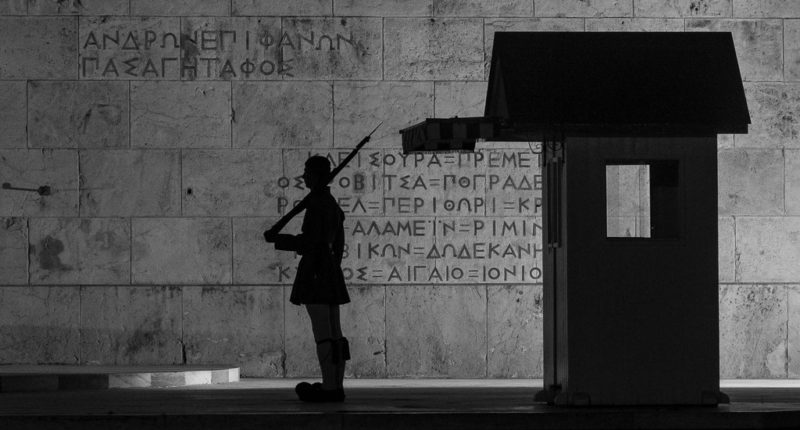Death is a mousy little woman with skin the colour of the clay which abounds in the swamps. Behind round wire-rimmed spectacles made of the flimsiest glass, slit black eyes blink at you. Bright yellow light pours into the room from the open doorway in which you stand.
She sits at the head of a long scarred wooden table, dressed in a gown made of bark cloth, her green hair done in tight round knots. Bantu knots – you can almost hear your sister Clara’s voice hissing the words at you. The memory of her sitting at her dresser with her hands in her kinky hair is fresh in your mind.
“Well, boy?” Death says in a voice so unlike her appearance you take a surprised step back. “Are you going to come in, or are you going to stand there like a fool?”
Her voice belongs in a classroom, perched in a schoolgirl’s larynx – it’s singsong, sharp, and reeks of sunshine and crayons. You blink. How did you get here? All you remember is falling and falling. You step inside, shutting the gnarled wooden door. The room is plunged into darkness, and you stumble toward the table, one arm stretched out to feel for directional objects. Your knee bumps into what feels like a chair’s leg, and you squeal in pain and curse out loud.
“For goodness’ sake, War, turn on a light!” Death snaps in the darkness. “He can’t see as well as we can in the dark.”
Blue light fills the room and bounces off three stone walls; you can’t pinpoint its source. The room is triangular and otherwise ordinary, with wooden cabinets lining two of the walls. Five pairs of glowing red eyes swivel in your direction, all framed by hoods of a blackness so absolute you hadn’t noticed those donning them before. It’s cold in this room where Death holds court with her special guests, and you can smell the distinct aroma of mould.
“It’s not our fault that it can’t see. It doesn’t belong here,” one of the hooded figures – War, you assume – says. He says ‘it’ like it’s filthy, and his eyes flash at you with something akin to hatred but not quite. Another of the hooded figures, this one with a feminine voice, says, “Don’t be rude, War. It’s your fault as well that we need an intern. After all, Death did say we had all been slacking.”
“Oh, shush, Pestilence; you’re one to talk,” Death says. She rolls her eyes and leans forward, lowering her voice to a stage whisper.
“Pestilence here has been registering lower numbers with each passing year. Every time she comes up with something she swears will work like a charm, the mortals thwart her efforts with ever increasing efficiency.”
“Your comments are unkind, Death,” Pestilence moans. You can see her face if you squint – a white shadow under the cowl of her cloak. The figure next to her chortles, and its hood falls back. You gasp as its face is revealed. It’s enthralling in its grotesqueness; fat cheeks wobble and vibrate to join a fat neck composed of rolls upon rolls of black flesh.
“Pestilence, the last time you had a successful campaign was with Ebola, and you had to use monkeys. Monkeys!” the fat figure says, eyes gleaming with humour. It – he – sounds like the fat kid you went to primary school with who always had Big Bom lollipops in his pockets and chocolate stains on his pudgy fingers. You’re confused. Intern? War? Pestilence? What’s happening?
“Silence, Famine,” Death says, her voice ringing with finality. She points a short finger with a sharp pale fingernail at you and asks, “Are you the intern Walumbe sent me?”
You wince. “Nyamiyonga sent me here.”
“Oh, you’re Nyamiyonga’s subject!” she exclaims. She turns to the silent hooded figure to her right and explains, “I raised the runt. Turned him into the king of the Nyoro underworld. Not much of a kingdom, if you ask me.”
She turns back to you and asks, “Has it changed any?”
You fidget in your seat. All of this isn’t making sense. You came here expecting the worst, expecting doom and gloom and like the smoke screens over the sound of drums you saw in Nigerian movies. A cloaked skeletal figure with a face hidden in a cowl, perhaps. Not this near playful camaraderie, not a Death who looks like a poorly coloured Disney character.
“I’ve only been there once,” you say. “I’ve lived among humans all my life.”
“I’ve lived among humans for centuries,” a hooded figure says. This one sounds like a French Madame in a brothel. She removes her hood, and she is stunningly beautiful, her clay-grey skin smooth and soft-looking, her neck and ears adorned with many gleaming gold rings.
“All I’ve learnt is that they are disgusting greedy creatures, and they all deserve to die,” she sniffles. Death rolls her eyes again.
“Melodrama suits you, Poverty,” she drawls, “but I’ll appreciate it if you save your remarks for another time.”
“Oh, do what you want,” Poverty mutters, waving a smooth hand covered in gold and platinum rings sporting so many precious gems your eyes hurt from the reflection. “You always do anyway.”
Death rolls her eyes a third time. There is collusion in the half-smile she gives you, like she’s saying, “Can you imagine these ones?”
“What is your name?” she asks.
“Nyamayarwo,” you mutter. She sucks in a breath and holds her hand to her chest. “My, what a beautiful name! It’s almost like you were made just for me.”
Your nape itches, like the door behind you is telling you to get the hell out. Her words make your skin crawl, like they’re right underneath it. The situation is so absurd you’ve half-forgotten why you came here in the first place.
There’s a sudden rumble, and War shoots to his feet. His hood falls back, and you want to cover your eyes, to weep at the fury of his countenance. His skin is the same angry red as his eyes, and a pointed spine rises in the middle of his bald head.
“I will not have this!” he roars, slamming a fist down onto the table. Vaguely, you wonder if that’s how the table got all its scars.
“You call me away from my duties to sit in a meeting where you flaunt your desire to bring a human into our ranks?” he says. His voice is the thundering of hoof beats on a battlefield soaked in the blood of men, the crack of cannons and machine guns. He points a glowing red finger at you and says, “I will not stand for this!”
Then he disappears, in a cloud of heat you can only feel but not see. Poverty sighs dramatically and fans an elegant pale hand in front of her face.
“Where did he go?” you ask stupidly. Death rolls her eyes again – how does someone so juvenile have so much power, you wonder – and replies, “To Syria, to Venezuela, who knows? His injured pride will recover.”
She jabs the silent figure next to her in the ribs with her elbow. “We have company, Senescence. Be polite; say hello.”
Senescence’s hood falls back, and you inhale sharply. Senescence is a little boy who looks no older than ten. His hair is green, like Death’s, and it curls atop his head, conniving with his ruddy rounded cheeks to give him the look of a cherub. Ah, he must be who people see when they speak of the angel of death. No wonder many old people die with smiles on their faces. You would smile too if this child came to relieve you of your existential duty.
“So Senescence,” you say, “is a child who maintains his youth by sucking the life from mortals?”
“I find your words unamusing, half-breed,” Senescence says, and his voice shuts you up. He looks like a child, but he sounds like Olu Jacobs. There’s so much age in his rumbling powerful voice that you squint at his chin, hoping for a glimpse of at least a strand of grey hair.
Death claps again and beams at you. “Enough! Nyamayarwo, you have met my sentinels. You say Nyamiyonga sent you here. Why are you here?”
You rub the back of your shaven head and say, “I come to… make a bargain.”
Poverty laughs, the sound devoid of mirth. “Look at your humanity rearing its ugly head. Something for something – it’s all your kind knows.”
Death pins Poverty with a hard stare and says, “The slums haven’t been feeling your presence as much as I would like of late. Perhaps you should go and visit them.”
Poverty huffs and disappears in a whirlwind of black smoke and flying robes. You feel a weight you hadn’t known was present lifted from your chest with her absence. Death smiles kindly at you and says, “You’re here for someone’s life.”
Death’s visage is blurred in your teary vision. You wipe the tears away with angry swipes of your hands. You’re not a child; you shouldn’t weep.
“My sister,” you say. “I’m here for my sister.”
“I can’t give back that which has been in the worlds of the dead for more than three days.”
You shake your head. “She’s not dead.”
“Ah,” Death says, “she’s not dead yet. And you would like her to stay alive.”
You nod. She tips her head to the side and watches you with speculative eyes which glimmer behind flimsy glass. “What will you give me in exchange for your sister’s life?”
“My soul,” you say, and you mean it.
“I can give your sister to Senescence,” Death offers. You grit your teeth and growl, “That’s not enough.”
“The human has some spine,” Senescence says. Death nods and rises to her feet. The black aura which rises with her is twice her height and so sinister it sends chills scuttling down your legs.
“I like some spine in my sentinels,” she says, and you wonder when her voice became so deep and dark, with no trace of the schoolgirl cheer she’d used to lull you into a sense of safety. A false sense of safety, you now realise.
With every step she takes toward you, your heart pumps once and shrivels, so that by the time she gets to where you sit, it is nothing but a small speck in your chest, its feeble beats reminding you of your humanity.
“I like spine, but I like loyalty better, and I will have yours until this world is passed,” Death says, and there is no light in her black eyes, only sad endings to all the fairy tales you know. How could you ever think you could bargain with Death?
You nod like a man possessed. She holds out her small hand, and the helplessness in your expression is reflected in her leering black eyes as you let her pull you to your feet. She leads you to a door you hadn’t noticed in one of the side walls. Something is begging you to run, pleading with you to tug free of Death’s hold and return to your simple mortal life. Your heart beats a rhythm of protest, but your feet are slaves to Death’s urging, leading you into the darkness which beckons from the open door.
The darkness envelops you in a nefarious hug, and your only tether to reality is Death’s cool hand and the sound of her singsong voice.
“I’m not an unkind mistress,” she says. Your mind refuses to take her word as truth. Voices, small murmurs, babble in the background. Are they in your head, or are they souls trapped in this darkness which threatens to consume you?
“You give me your soul,” Death says. “In exchange, I will give you my eyes.”
Fingers crawl along the sides of your face. You open your mouth to scream, but the pain is there before the sound. The fingers dig into your eye sockets, and you jerk back but find yourself held in place by Death’s hand. Fire licks its way up your arm and wraps itself around what’s left of your heart. The pain in your eyes is all you can feel for a moment, then there’s no more pain, and you can see.
With your new eyes, Death is a mousy little woman with skin the colour of the gold which abounds in the soils of Karamoja. Behind round wire-rimmed spectacles made of the flimsiest glass, round eyes of a vibrant brown smile at you, and your Mistress says, “Welcome, Sentinel.”









